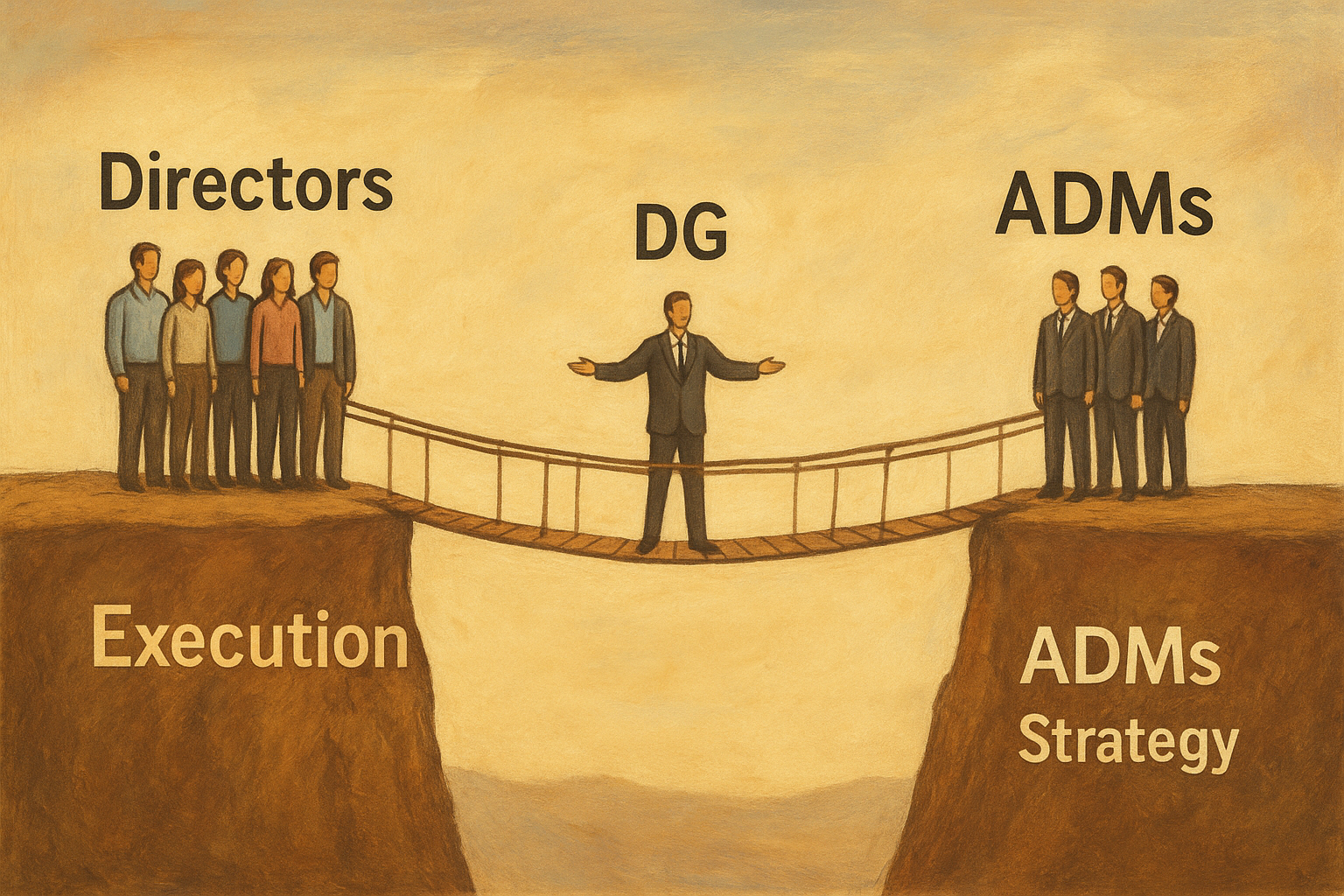DGs as Operational Sponsors
Directors General (DGs) are at the operational frontlines of transformation, translating high-level strategic mandates from Ministers and Deputy Ministers (DMs) into actionable results. In government digital and organizational initiatives, DGs ensure that teams adopt new tools, processes, and workflows while maintaining service quality and regulatory compliance.

DGs’ responsibilities extend beyond simple execution: they resolve interdependencies, coach staff, and make operational decisions that sustain transformation. Their leadership is pivotal because even well-funded, well-governed initiatives fail without effective operational sponsorship.
DG Responsibilities in Transformation
- Operationalizing Strategy
- Translate departmental priorities into actionable work plans, milestones, and deliverables.
- Ensure alignment with Ministerial mandates and DM oversight while adapting to directorate realities.
- Empowering Teams
- Coach directors and managers to adopt new systems and processes.
- Encourage accountability and innovation, fostering confidence in teams to implement change.
- Resource and Risk Management
- Allocate personnel, budget, and technical resources effectively.
- Anticipate operational risks and escalate issues when necessary to DMs.
- Monitoring and Reporting
- Track KPIs for adoption, efficiency, and quality.
- Provide timely updates to ADMs and DMs, offering recommendations for course correction.
- Decision-Making and Problem Solving
- DGs are expected to make independent operational decisions, even if it means challenging entrenched cultural norms to achieve outcomes.
- Balance innovation with compliance and political sensitivities.
Challenges for DGs
- Cultural Resistance: Staff may be reluctant to adopt new digital tools or processes. DGs must combine coaching, incentives, and communication to overcome barriers.
- Interdepartmental Dependencies: Projects often involve multiple branches, requiring negotiation and influence without direct authority.
- Resource Constraints: Competing operational priorities may create conflicts in staffing or budgeting.
- Accountability Pressure: DG decisions are closely monitored by ADMs, DMs, and Ministers; operational missteps can have political consequences.
Best Practices
- Lead by Example
- Demonstrate commitment to change through visible actions, meetings, and communications.
- Model the behaviors expected of staff.
- Empower and Guide Directors
- Delegate responsibility while providing clear expectations and coaching.
- Foster accountability and problem-solving capacity at all levels.
- Integrate Change into Daily Operations
- Embed new workflows and processes into routine tasks.
- Ensure adoption is sustainable rather than treated as a temporary project.
- Balance Innovation with Compliance
- Encourage experimentation while maintaining security, privacy, and regulatory standards.
- Measure Impact
- Track quantitative metrics like adoption rates, processing times, and service quality.
- Gather qualitative insights through surveys, feedback sessions, and staff observations.
- Communicate Effectively Upward and Outward
- Keep ADMs and DMs informed with accurate, timely, and actionable updates.
- Highlight successes and explain corrective actions to maintain trust and credibility.
Case Example: Implementing a Digital Service Initiative
A department rolled out a new online portal for citizen services:
- Ministerial Role: Advocated for the “digital-first” approach and secured funding.
- DM Role: Provided governance, aligned branches, and monitored overall progress.
- ADM Role: Coordinated divisions, developed KPIs, and empowered DGs for implementation.
- DG Role: Oversaw operational rollout, coached directorates, resolved adoption challenges, and reported metrics to ADMs.
Outcome: Within six months, citizen usage increased by 55%, processing times decreased by 35%, and staff reported greater confidence in the digital system. DG leadership was crucial for converting strategic intent into measurable outcomes.
Risks of Weak DG Leadership
Without strong DG sponsorship:
- Fragmented Implementation: Directorates may pursue inconsistent approaches.
- Low Staff Adoption: Lack of guidance and operational support leads to disengagement.
- Delayed Outcomes: Projects may stall due to poor coordination.
- Reduced Political and Operational Credibility: Failures erode confidence of ADMs, DMs, and Ministers.
Research emphasizes DG-level operational sponsorship as critical to sustainable public sector transformation (Balogun, 2003; Fernandez & Rainey, 2006).
Supporting DGs
To strengthen DG impact:
- Leadership Coaching: Focus on operational decision-making, team coaching, and risk management.
- Operational Tools: Dashboards, templates, and frameworks support monitoring and reporting.
- Cultural Support: Enable DGs to champion change, influence teams, and sustain adoption.
- Peer Networks: Facilitate sharing of lessons learned and best practices across departments.
Conclusion
DGs are the operational backbone of government transformation. Their ability to implement strategy, manage teams, and oversee resources ensures that Ministerial priorities and DM directives result in measurable outcomes.
Strong DG leadership fosters:
- Staff engagement and capability building
- Consistent operational adoption of digital and organizational initiatives
- Reliable measurement and reporting of outcomes
- Long-term sustainability of transformation initiatives
By empowering directorates, making operational decisions, and integrating change into daily operations, DGs ensure that transformation initiatives deliver real value for citizens and government.
What’s Next?
Institute X partners with DGs to provide leadership coaching, operational frameworks, and tools to embed transformation effectively and sustainably.
References:
- Balogun, J. (2003). From blaming the middle to harnessing its potential: Creating change intermediaries. British Journal of Management, 14(1), 69–83.
- Fernandez, S., & Rainey, H. G. (2006). Managing successful organizational change in the public sector. Public Administration Review, 66(2), 168–176.
- Kotter, J. P. (2012). Leading Change. Harvard Business Review Press.


Leave a Reply
You must be logged in to post a comment.